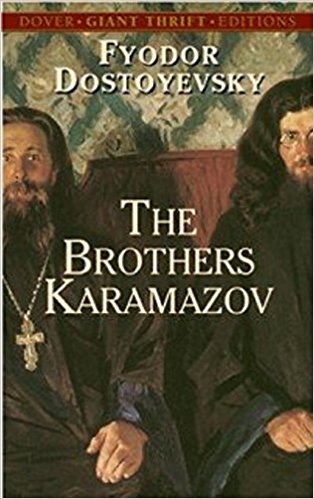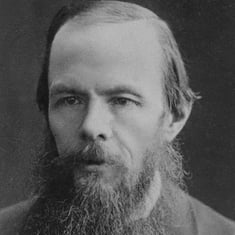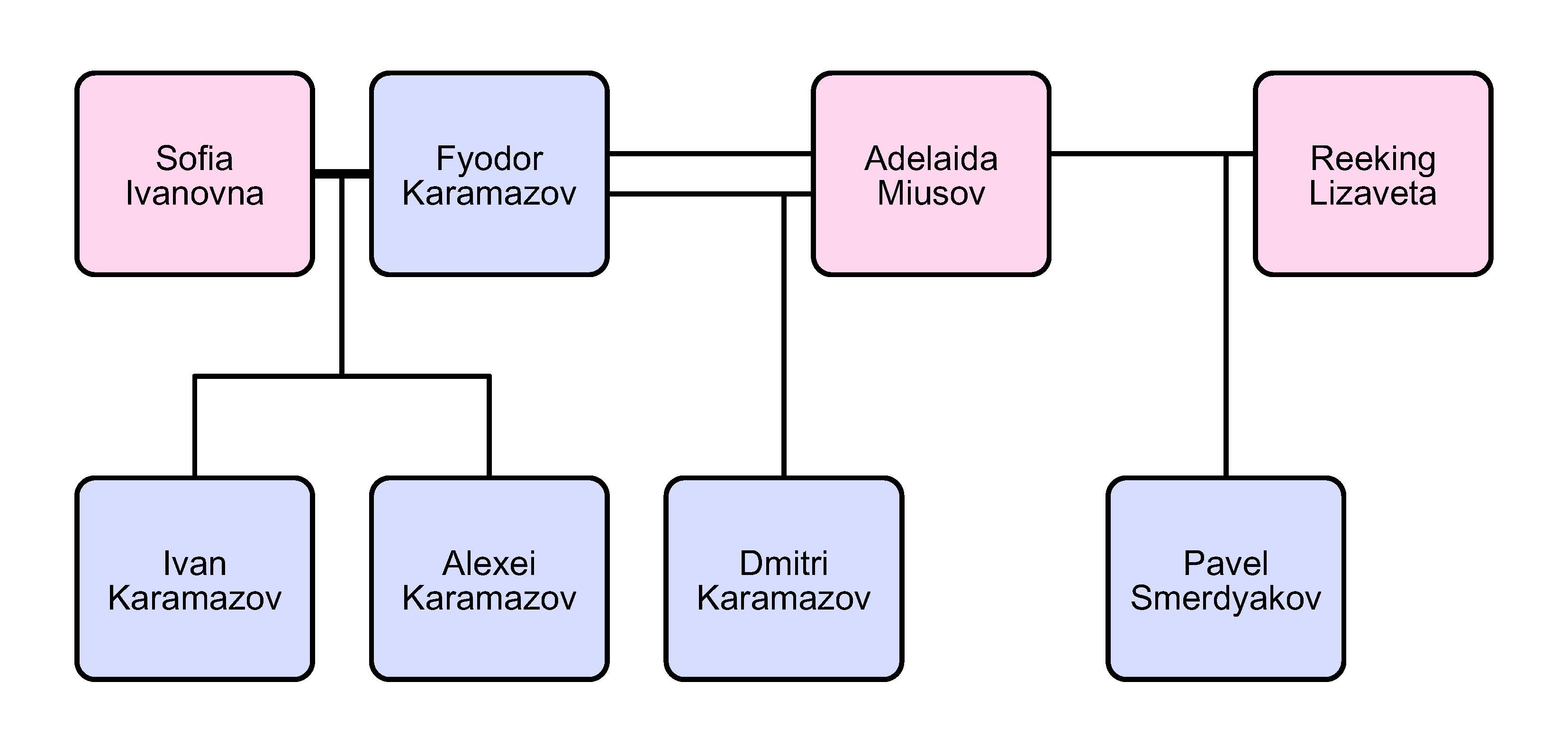The Brothers Karamazov Summary
11 min read ⌚
 There aren’t many novelists more famous or discussed than Fyodor M. Dostoevsky.
There aren’t many novelists more famous or discussed than Fyodor M. Dostoevsky.
And there is one novel in his oeuvre – completed just four months before his death – that stands out:
Who Should Read “The Brothers Karamazov”? And Why?
Let us put it this way: if you had to read only ten novels in your life, The Brothers Karamazov should undoubtedly be among them.
See “Our Critical Review” section for more.
Or trust our word and read this book as soon as you find the time.
Fyodor M. Dostoevsky Biography
 Fyodor M. Dostoevsky was a Russian writer, one of the masters of the psychological novel and, according to many, one of the very greatest novelists in the history of literature.
Fyodor M. Dostoevsky was a Russian writer, one of the masters of the psychological novel and, according to many, one of the very greatest novelists in the history of literature.
Dostoevsky lived somewhat chaotic life, which, at one point, resulted in a death sentence, commuted at the very last second. The experience scarred Dostoevsky for life, and even though at times he had to beg for money – most of which he had the habit of squandering on gambling – he never lost his Orthodox Christian faith.
He wrote 17 short stories, 3 novellas, and 11 novels; each of them has been analyzed in detail by literary critics and theorists from all over the world.
However, three of his novels are widely considered to be not only part of the European Literary Canon, but also its very center: Crime and Punishment, The Idiot, and The Brothers Karamazov.
Dostoevsky influenced so many prominent writers and thinkers that even a long list of them would be unfair to some of the greatest novelists of the 20th century.
Plot
Set in 19th-century Russia, The Brothers Karamazov is a philosophical novel which explores the interrelation between God, free will, and ethics through the lives of four half-brothers, each one more memorable than the next.
It is, indeed, one of those “once-in-a-century” masterworks which are bound to touch the hearts of many readers and even change the minds of many others.
At about 1,000 pages, The Brothers Karamazov is a rather long work, and there are quite a few characters in it; since, at times, our summary may seem a bit difficult for you to follow, we prepared for you a simplified genealogical table of the main characters in the novel.
Return to it every time you have troubles navigating yourself in the story.

Book One: A Nice Little Family
The first book of The Brothers Karamazov introduces the Karamazov family.
Here we learn many things about Fyodor Pavlovich Karamazov, the 55-year-old head of the family. He is a parasite, utterly uninterested about the fate of his sons, and he has at least three of them.
Dmitri Karamazov, aka Mitya, is his eldest son, the only child of his marriage with Adelaida Ivanovna Miusov. He is engaged to be married to Katerina Ivanovna Verkhovtseva, aka Katya, but openly expresses his admiration for Agrafena Alexandrovna Svetlova, aka Grushenka. Strangely enough, Fyodor too has some lustful feelings for Grushenka.
Ivan Karamazov, at 24, is Fyodor’s middle son, the first from his marriage with Sofia Ivanovna. He has some feelings for Katya, his half-brother’s fiancée, and is an atheist.
Alexei Karamazov, aka Alyosha, is the youngest of the three brothers (20 years old), and the second child of Fyodor’s second marriage. Contrary to Ivan, Alexei is a novice in a local Russian Orthodox monastery, a member of a somewhat mysterious religious order of Elders.
Book Two: An Inappropriate Gathering
Dmitri is similar to his father: both spend large amounts of money on earthly pleasures; and, at the beginning of the novel, Dmitri comes back to his birth house in search of some inheritance he believes his father is withholding from him.
So as to solve the dispute, in the second book, the Karamazovs visit a local monastery where Father Zosima, the Elder, Alyosha’s teacher, can act as a sort of a spiritual mediator.
Let’s just say, for all his effort, he doesn’t do a good job; at the end, the conflict between Dmitri and Fyodor is only made worse.
Book Three: Sensualists
Here we learn that the conflict over the inheritance isn’t the only one Dmitri and Fyodor have between them.
As we noted above, they are both passionately in love with the same person, the 22-year-old Grushenka.
So it comes as no wonder that in Book Three, Dmitri bursts into the house of his father, assaults Fyodor, and threatens to come back and kill him at some point in the future.
The third book also introduces Pavel Smerdyakov, a servant at Fyodor’s house but also someone everybody believes to be Fyodor’s illegitimate child by a mute woman of the street who died in childbirth.
Everybody knew her as “Reeking Lizaveta” which is why Pavel’s surname is Smerdyakov: that is Russian for Reeking.
Pavel was raised by Fyodor’s servant Grigory Vasilievich Kutuzov and his wife Marfa and has spent all of his life working as Fyodor’s cook and lackey.
He is also an epileptic whose pretty worrisome childhood habits include one of collecting stray cats and hanging them.
Book Four: Lacerations/Strains
Book four introduces the side story of the Snegiryov family.
It begins with Alyosha noticing a group of schoolboys throwing rocks at a boy whose name, we learn, is Ilyusha. Alyosha helps him, but Ilyusha bites his finger.
The reason?
He is the son of a former staff-captain who was once humiliated by Dmitri in a bar fight.
Learning of the many problems the Snegiryov family is in, Alyosha tries to give some money to Ilyusha’s father, both to help his ailing wife and as an apology for the behavior of his brother.
Out of pride, Snegiryov eventually refuses the money.
Book Five: Pro and Contra
Ivan meets Alyosha at a restaurant and Dostoevsky uses this meeting to pit one against other their profoundly incompatible and conflicting philosophies.
Ivan explains his nihilistic atheism to his brother, and, in one of the most famous chapters ever written, “The Grand Inquisitor,” recounts a supposed poem of his (though there are almost no verses) which describes the meeting of Jesus and a leader of the Spanish Inquisition in 15th-century Seville.
As expected – even though nobody expects the Spanish Inquisition – the Grand Inquisitor puts Jesus in jail, and asks him:
Why shouldst Thou now return, to impede us in our work? For Thou hast come but for that only, and Thou knowest it well. But art Thou as well aware of what awaits Thee in the morning? I do not know, nor do I care to know who thou mayest be: be it Thou or only thine image, to-morrow I will condemn and burn Thee on the stake, as the most wicked of all the heretics; and that same people, who to-day were kissing Thy feet, to-morrow at one bend of my finger, will rush to add fuel to Thy funeral pile… Wert Thou aware of this?
However, after the Grand Inquisitor makes his argument that it’s all Jesus’ fault for he should not have given men free will, Jesus “bends towards him and softly kisses the bloodless, four-score and-ten-year-old lips.”
The Grand Inquisitor shudders, and then “goes to the door, opens it, and addressing Jesus, ‘Go,’ he says, ‘go, and return no more.”
Even though the kiss burns inside the Inquisitor’s heart, “the old man remains firm in his own ideas and unbelief.”
After hearing the story, suddenly, Alyosha goes to Ivan kisses his brother on the lips.
Ivan is stunned and shouts with delight.
Book Six: The Russian Monk
This book deals almost exclusively with Father Zosima, relating his life from his rebellious youth to his death, as he lies on the brink of it in his cell.
We learn that he found God in the middle of a duel, and that, ever since he has served Him and humanity.
His religious philosophy is much akin to Donne’s “no man is an island” or Martin Luther King’s “inescapable network of mutuality.”
Namely, we all sin, but all of our sins are interrelated; so, redemption starts at the moment one finds the courage to forgive other people’s sins, for which he is almost as responsible as for his own.
Book Seven: Alyosha
After the death of Zosima, his body starts decomposing.
A fact of life, you’d think, but, to Alyosha and almost everybody who had ever known or respected Zosima, nothing short of the Apocalypse.
You see, it is a commonly held belief that the bodies of saints are incorrupt and, thus, after death, they do not decompose.
However, Zosima’s starts the process almost immediately, and after a single day, the smell it exudes is unbearable.
This visibly and genuinely shakes Alyosha’s beliefs.
A companion of his named Rakitin uses Alyosha’s vulnerability to set up a meeting between him and Grushenka.
However, the joke’s on him, because it is through this meeting that Alyosha finds the thing he had temporarily lost: profound faith.
Moreover, upon her discussion with him, Grushenka also starts thinking of spiritual redemption and sees in Alyosha someone who may help her find this path; because, for once, he doesn’t care about her body, but about her soul.
The two become close friends.
The book ends with Alyosha kissing the earth and convulsively crying, probably mirroring the last thing Father Zosima did before leaving his earthly body.
Book Eight: Mitya
In Book Eight, we find out that Dmitri owes money to his fiancée Katerina, and that he fears that Grushenka will choose his father over him because of his lack of money.
This is the reason why he was so interested in his father’s inheritance in the first place, and why, in this book, he goes to a neighboring town.
However, the promise of a business deal there fails, and when he returns back, he discovers that Grushenka is not where she is supposed to be.
He immediately goes to his father’s house, with a brass pestle in his hand.
The next thing we know, he’s hitting the servant Gregory in his head with the pestle, and running away from Fyodor’s house in mad haste.
He’s all covered in blood, and there’s a pile of money in his hand.
To make matters worse, next he finds out that Grushenka is, in fact, with an ex-lover of her. Dmitri heads to where they are supposed to be, planning to humiliate Grushenka and kill himself the next morning.
However, there he learns that Grushenka is in love with him.
As soon as they start making plans to marry, the policemen arrive and arrest Dmitri on suspicion that he has murdered Fyodor.
Book Nine: The Preliminary Investigation
Even though Dmitri maintains that he has nothing to do with his father’s death, all of the evidence points to him.
First of all, everybody knows of the conflict between the two.
Secondly, the money Fyodor had set aside for Grushenka is missing, and Dmitri was seen running bloodstained with thousands of rubles in his hand soon after Fyodor’s murder.
Thirdly, Dmitri needed money – both because of his debt to Katerina and because of his planned marriage with Grushenka.
And finally, there was no one else in the house except for Dmitri and Pavel, and the latter had an epileptic seizure which should have rendered him incapable to even attack, let alone kill Fyodor.
You can’t blame the police for formally charging Dmitri with patricide and locking him up in prison while awaiting trial.
Book Ten: Boys
Now, we’re back to the side story.
In addition to being informed that Ilyusha’s sickness has worsened and that he will probably not recover, we are also introduced to one of the boys who, back in Book Four, threw stones at Ilyusha: Kolya Krasotkin.
It seems that the reason for the scuffle between the two was Ilyusha’s decision to accept a suggestion by Smerdyakov and feed a dog with a loaf of bread in which he had stuck a sharp pin.
Through Alyosha’s intervention, Kolya and the other schoolboys gradually reconcile with Ilyusha and join him at his bedside.
Here, Kolya shares his socialistic, nihilistic, atheist theories with Alyosha, whose words strike a chord with him; by the end of this book, Kolya starts reassessing his beliefs.
Book Eleven: Brother Ivan Fyodorovich
Brother Ivan Fyodorovich Karamazov, one of the most memorable characters in the history of world literature, slowly descends into madness.
During the course of Book Eleven, he has three meetings with Smerdyakov, the last one of which is the most striking one.
Namely, Smerdyakov confesses to Ivan that he was the one who had murdered Fyodor and stolen his money, after faking an epileptic seizure; he even presents the stolen money as evidence.
Ivan is stunned to hear this, but Smerdyakov is even more surprised at Ivan’s disbelief.
As far as Smerdyakov is concerned, Ivan is at least as responsible for the murder as himself, because he had told him when he would be leaving the house and because he made him believe that in a world without God everything is permitted.
Book Eleven ends with Ivan hallucinating a visitation from the devil, who torments and taunts him by mocking his beliefs.
It is in this condition that Alyosha finds him and informs him that Smerdyakov has committed suicide.
Book Twelve: A Judicial Error
Book Twelve is practically a courtroom drama, detailing the trial of Dmitri Karamazov.
As one would expect, the part which attracts the most attention at the trial is the love triangle between Dmitri, Grushenka, and Fyodor.
Another thing which attracts attention is Ivan, who recounts his final meeting with Smerdyakov and tells of his confession.
Nobody believes him: he is dragged away from the courtroom after his madness takes hold of him.
Katerina – who, by this time, has developed feelings for Ivan – links Ivan’s madness with her supposed love for Dmitri.
So, she presents to the court a letter in which Dmitri says that he would kill Fyodor.
You know the verdict:
Guilty.
The Brothers Karamazov Epilogue
In the “Epilogue” to The Brothers Karamazov, we learn that the brothers are planning to help Dmitri – who they know is not guilty – escape from his sentence of 20 years of labor in Siberia.
We also learn that Dmitri is, in the meantime, in hospital, recovering from an illness and waiting to be taken away.
He begs to be visited by Katerina, who eventually does that.
Dmitri uses the occasion to apologize to her for all the pain he has caused her; Katerina, in turn, apologizes for the letter she had presented during the trial.
They part agreeing to love each other until their deaths – even though they are in love with different people at the moment.
In the meantime, Ilyusha dies, and at this funeral, Alyosha gives a speech to his friends from school. In the speech, he promises to remember each and every one of them and implores them to remember Ilyusha in much the same manner.
Moreover, he requests from them to remember, until it is possible, the beauty of that very moment, at the stone of Ilyusha, when everybody was together and when they all loved each other.
In tears, the children agree to do that and, after joining hands, they all return to the house of Snegiryov.
There, they hold a funeral dinner, during which everybody chants: “Hurrah for Karamazov! Hurrah for Karamazov!”
Like this summary? We’d like to invite you to download our free 12 min app for more amazing summaries and audiobooks.
“The Brothers Karamazov Summary Quotes”
The awful thing is that beauty is mysterious as well as terrible. God and the devil are fighting there, and the battlefield is the heart of man. Share on X I can see the sun, but even if I cannot see the sun, I know that it exists. And to know that the sun is there - that is living. Share on X I think the devil doesn't exist, but man has created him, he has created him in his own image and likeness. Share on X Besides, nowadays, almost all capable people are terribly afraid of being ridiculous, and are miserable because of it. Share on X What is hell? I maintain that it is the suffering of being unable to love. Share on XOur Critical Review
Albert Einstein thought that The Brothers Karamazov was “the supreme summit of all literature.” Sigmund Freud believed that it is “the most magnificent novel ever written.” Ludwig Wittgenstein read it “so often he knew whole passages of it by heart.” He even brought it with him to the front.
Believe us – we can go on.
But we don’t think there’s any need to do that.
Simply put, The Brothers Karamazov is one of the greatest achievements in world literature.
Emir is the Head of Marketing at 12min. In his spare time, he loves to meditate and play soccer.







